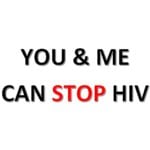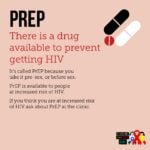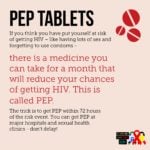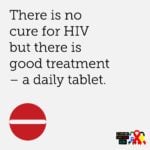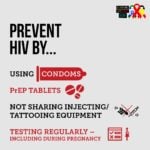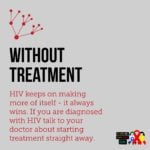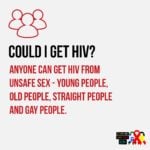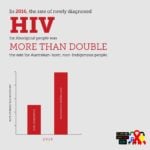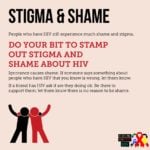All of us have a role to play in stopping HIV in our communities by:
Using Condoms
One way to protect yourself and your partners from HIV and most STIs is to use condoms and water-based lubricant during sex.
Sex with condoms is called safe or protected sex because condoms keep people safe from HIV and most other STIs.
Sex without a condom is called unsafe or unprotected sex because it can put you or your partner at risk of getting HIV or other STIs.
It’s best to use condoms every time – especially with a new partner, or when you start a new relationship
Safe tattooing and body piercing
HIV transmission from body piercing or tattooing is highly unlikely, but the blood of an infected person can be left on equipment that is later used to pierce or tattoo someone else. 
Other blood-borne viruses such as hepatitis B and C can be transmitted by sharing tattooing and piercing equipment.
The best way to avoid the risk of getting a blood borne virus from tattooing or piercing is to have them done professionally.
Using safe injecting equipment
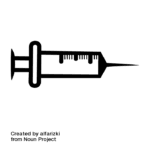
If you inject drugs it’s important to use clean injecting equipment – and not share equipment. Injecting equipment includes: needles, syringes, spoons, swabs, filters and tourniquets.
A needle or syringe may look clean but there could be a tiny amount of blood you can’t see – enough for getting HIV. You can get new needles and syringes in needle and syringe program services, some chemists, at health clinics and at some community centres.
Ask about where you can get equipment at the clinic.
Knowing about PEP
PEP stands for post-exposure prophylaxis.
PEP means taking HIV drugs after you think you may have been exposed to HIV for example after having sex without a condom, having unwanted sex, or after sharing injecting or tattooing equipment. PEP involves taking HIV drugs for a month after the incident, but the most important thing about PEP is it needs to be started within 72 hours of the incident where you think you may have been exposed.
See our PEP factsheet here: PEP factsheet
PEP is available from sexual health clinics, hospital emergency departments or GPs – don’t waste time.
Learning about PrEP
PrEP stands for Pre-Exposure Prophylaxis or taking a tablet daily to prevent HIV.
PrEP is for people who don’t have HIV and want to prevent HIV. Some people take PrEP because they know their partner has HIV and they want extra protection. Other people take PrEP because they want to enjoy sex without the worry of catching HIV.
Take a look at our PrEP animation here: Click here
See our PrEP factsheet here: PrEP factsheet
PrEP is not for everyone. Talk to your doctor about PrEP if you want to know more about PrEP.
Looking out for cuts
HIV can be transmitted through open cuts. If you have an open cut on your body cover it up, especially when playing contact sports.
Is there a vaccine against HIV?
No. There’s no vaccine to protect people from getting HIV yet, scientists are working on this.

